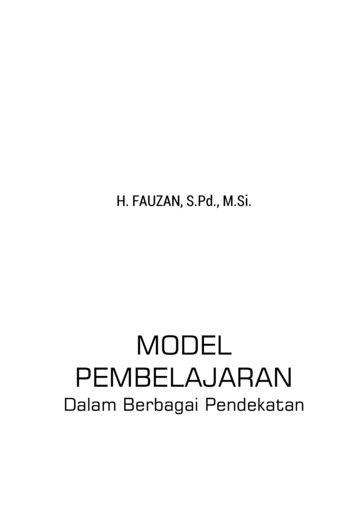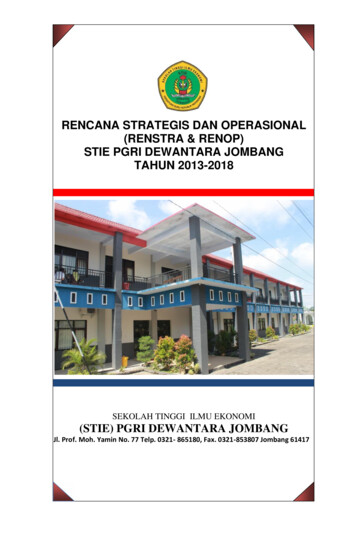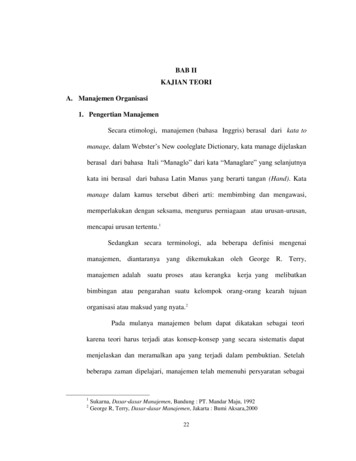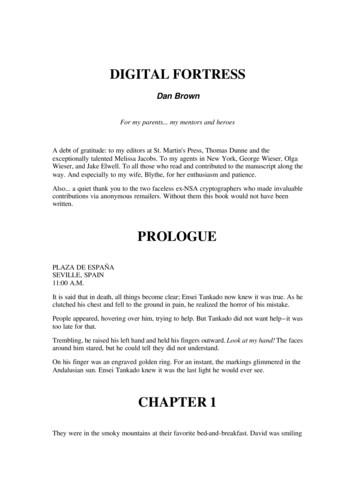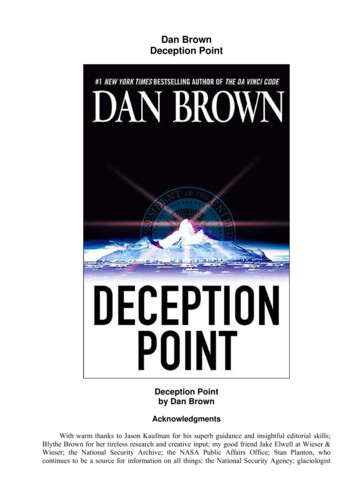
Transcription
Dan BrownDeception PointDeception Pointby Dan BrownAcknowledgmentsWith warm thanks to Jason Kaufman for his superb guidance and insightful editorial skills;Blythe Brown for her tireless research and creative input; my good friend Jake Elwell at Wieser &Wieser; the National Security Archive; the NASA Public Affairs Office; Stan Planton, whocontinues to be a source for information on all things; the National Security Agency; glaciologist
Martin O. Jeffries; and the superb minds of Brett Trotter, Thomas D. Nadeau, and Jim Barrington.Thanks also to Connie and Dick Brown, the U.S. Intelligence Policy Documentation Project,Suzanne O’Neill, Margie Wachtel, Morey Stettner, Owen King, Alison McKinnell, Mary andStephen Gorman, Dr. Karl Singer, Dr. Michael I. Latz of Scripps Institute of Oceanography, Aprilat Micron Electronics, Esther Sung, the National Air and Space Museum, Dr. Gene Allmendinger,the incomparable Heide Lange at Sanford J. Greenburger Associates, and John Pike at theFederation of American Scientists.Author’s NoteThe Delta Force, the National Reconnaissance Office, and the Space FrontierFoundation are real organizations. All technologies described in this novel exist.“If this discovery is confirmed, it will surely be one of the most stunning insightsinto our universe that science has ever uncovered. Its implications are as far-reaching andawe-inspiring as can be imagined. Even as it promises answers to some of our oldestquestions, it poses still others even more fundamental.”President Bill Clinton, in a press conference following a discovery knownas ALH84001 on August 7, 1997PrologueDeath, in this forsaken place, could come in countless forms. Geologist Charles Brophy hadendured the savage splendor of this terrain for years, and yet nothing could prepare him for a fate asbarbarous and unnatural as the one about to befall him.As Brophy’s four huskies pulled his sled of geologic sensing equipment across the tundra, thedogs suddenly slowed, looking skyward.“What is it, girls?” Brophy asked, stepping off the sled.Beyond the gathering storm clouds, a twin-rotor transport helicopter arched in low, huggingthe glacial peaks with military dexterity.That’s odd, he thought. He never saw helicopters this far north. The aircraft landed fifty yardsaway, kicking up a stinging spray of granulated snow. His dogs whined, looking wary.When the chopper doors slid open, two men descended. They were dressed in full-weatherwhites, armed with rifles, and moved toward Brophy with urgent intent.“Dr. Brophy?” one called.The geologist was baffled. “How did you know my name? Who are you?”“Take out your radio, please.”“I’m sorry?”“Just do it.”Bewildered, Brophy pulled his radio from his parka.“We need you to transmit an emergency communiquй. Decrease your radio frequency to onehundred kilohertz.”One hundred kilohertz? Brophy felt utterly lost. Nobody can receive anything that low. “Hasthere been an accident?”The second man raised his rifle and pointed it at Brophy’s head. “There’s no time to explain.Just do it.”Trembling, Brophy adjusted his transmission frequency.The first man now handed him a note card with a few lines typed on it. “Transmit thismessage. Now.”
Brophy looked at the card. “I don’t understand. This information is incorrect. I didn’t–”The man pressed his rifle hard against the geologist’s temple.Brophy’s voice was shaking as he transmitted the bizarre message.“Good,” the first man said. “Now get yourself and your dogs into the chopper.”At gunpoint, Brophy maneuvered his reluctant dogs and sled up a skid ramp into the cargobay. As soon as they were settled, the chopper lifted off, turning westward.“Who the hell are you!” Brophy demanded, breaking a sweat inside his parka. And what wasthe meaning of that message!”The men said nothing.As the chopper gained altitude, the wind tore through the open door. Brophy’s four huskies,still rigged to the loaded sled, were whimpering now.“At least close the door,” Brophy demanded. “Can’t you see my dogs are frightened!”The men did not respond.As the chopper rose to four thousand feet, it banked steeply out over a series of ice chasmsand crevasses. Suddenly, the men stood. Without a word, they gripped the heavily laden sled andpushed it out the open door. Brophy watched in horror as his dogs scrambled in vain against theenormous weight. In an instant the animals disappeared, dragged howling out of the chopper.Brophy was already on his feet screaming when the men grabbed him. They hauled him to thedoor. Numb with fear, Brophy swung his fists, trying to fend off the powerful hands pushing himoutward.It was no use. Moments later he was tumbling toward the chasms below.1Toulos Restaurant, adjacent to Capitol Hill, boasts a politically incorrect menu of baby vealand horse carpaccio, making it an ironic hotspot for the quintessential Washingtonian powerbreakfast. This morning Toulos was busy–a cacophony of clanking silverware, espresso machines,and cellphone conversations.The maitre d’ was sneaking a sip of his morning Bloody Mary when the woman entered. Heturned with a practiced smile.“Good morning,” he said. “May I help you?”The woman was attractive, in her mid-thirties, wearing gray, pleated flannel pants,conservative flats, and an ivory Laura Ashley blouse. Her posture was straight–chin raised ever soslightly–not arrogant, just strong. The woman’s hair was light brown and fashioned inWashington’s most popular style–the “anchor-woman”–a lush feathering, curled under at theshoulders. long enough to be sexy, but short enough to remind you she was probably smarter thanyou.“I’m a little late,” the woman said, her voice unassuming. “I have a breakfast meeting withSenator Sexton.”The maitre d’ felt an unexpected tingle of nerves. Senator Sedgewick Sexton . The senator wasa regular here and currently one of the country’s most famous men. Last week, having swept alltwelve Republican primaries on Super Tuesday, the senator was virtually guaranteed his party’snomination for President of the United States. Many believed the senator had a superb chance ofstealing the White House from the embattled President next fall. Lately Sexton’s face seemed to beon every national magazine, his campaign slogan plastered all across America: “Stop spending.Start mending.”“Senator Sexton is in his booth,” the maitre d’ said. “And you are?”“Rachel Sexton. His daughter.”How foolish of me, he thought. The resemblance was quite apparent. The woman had thesenator’s penetrating eyes and refined carriage–that polished air of resilient nobility. Clearly thesenator’s classic good looks had not skipped generations, although Rachel Sexton seemed to carryher blessings with a grace and humility her father could learn from.
“A pleasure to have you, Ms. Sexton.”As the maitre d’ led the senator’s daughter across the dining area, he was embarrassed by thegauntlet of male eyes following her. some discreet, others less so. Few women dined at Toulos andeven fewer who looked like Rachel Sexton.“Nice body,” one diner whispered. “Sexton already find himself a new wife?”“That’s his daughter, you idiot,” another replied.The man chuckled. “Knowing Sexton, he’d probably screw her anyway.”***When Rachel arrived at her father’s table, the senator was on his cellphone talking loudlyabout one of his recent successes. He glanced up at Rachel only long enough to tap his Cartier andremind her she was late.I missed you, too, Rachel thought.Her father’s first name was Thomas, although he’d adopted his middle name long ago. Rachelsuspected it was because he liked the alliteration. Senator Sedgewick Sexton. The man was asilver-haired, silver-tongued political animal who had been anointed with the slick look of soapopera doctor, which seemed appropriate considering his talents of impersonation.“Rachel!” Her father clicked off his phone and stood to kiss her cheek.“Hi, Dad.” She did not kiss him back.“You look exhausted.”And so it begins, she thought. “I got your message. What’s up?”“I can’t ask my daughter out for breakfast?”Rachel had learned long ago her father seldom requested her company unless he had someulterior motive.Sexton took a sip of coffee. “So, how are things with you?”“Busy. I see your campaign’s going well.”“Oh, let’s not talk business.” Sexton leaned across the table, lowering his voice. “How’s thatguy at the State Department I set you up with?”Rachel exhaled, already fighting the urge to check her watch. “Dad, I really haven’t had timeto call him. And I wish you’d stop trying to–”“You’ve got to make time for the important things, Rachel. Without love, everything else ismeaningless.”A number of comebacks came to mind, but Rachel chose silence. Being the bigger person wasnot difficult when it came to her father. “Dad, you wanted to see me? You said this was important.”“It is.” Her father’s eyes studied her closely.Rachel felt part of her defenses melt away under his gaze, and she cursed the man’s power.The senator’s eyes were his gift–a gift Rachel suspected would probably carry him to the WhiteHouse. On cue, his eyes would well with tears, and then, an instant later, they would clear, openinga window to an impassioned soul, extending a bond of trust to all. It’s all about trust, her fatheralways said. The senator had lost Rachel’s years ago, but he was quickly gaining the country’s.“I have a proposition for you,” Senator Sexton said.“Let me guess,” Rachel replied, attempting to refortify her position. “Some prominent divorcйlooking for a young wife?”“Don’t kid yourself, honey. You’re not that young anymore.”Rachel felt the familiar shrinking sensation that so often accompanied meetings with herfather.“I want to throw you a life raft,” he said.“I wasn’t aware I was drowning.”“You’re not. The President is. You should jump ship before it’s too late.”“Haven’t we had this conversation?”
“Think about your future, Rachel. You can come work for me.”“I hope that’s not why you asked me to breakfast.”The senator’s veneer of calm broke ever so slightly. “Rachel, can’t you see that your workingfor him reflects badly on me. And on my campaign.”Rachel sighed. She and her father had been through this. “Dad, I don’t work for the President.I haven’t even met the President. I work in Fairfax, for God’s sake!”“Politics is perception, Rachel. It appears you work for the President.”Rachel exhaled, trying to keep her cool. “I worked too hard to get this job, Dad. I’m notquitting.”The senator’s eyes narrowed. “You know, sometimes your selfish attitude really–”“Senator Sexton?” A reporter materialized beside the table.Sexton’s demeanor thawed instantly. Rachel groaned and took a croissant from the basket onthe table.“Ralph Sneeden,” the reporter said. “Washington Post. May I ask you a few questions?”The senator smiled, dabbing his mouth with a napkin. “My pleasure, Ralph. Just make itquick. I don’t want my coffee getting cold.”The reporter laughed on cue. “Of course, sir.” He pulled out a minirecorder and turned it on.“Senator, your television ads call for legislation ensuring equal salaries for women in theworkplace. as well as for tax cuts for new families. Can you comment on your rationale?”“Sure. I’m simply a huge fan of strong women and strong families.”Rachel practically choked on her croissant.“And on the subject of families,” the reporter followed up, “you talk a lot about education.You’ve proposed some highly controversial budget cuts in an effort to allocate more funds to ournation’s schools.”“I believe the children are our future.”Rachel could not believe her father had sunk to quoting pop songs.“Finally, sir,” the reporter said, “you’ve taken an enormous jump in the polls these past fewweeks. The President has got to be worried. Any thoughts on your recent success?”“I think it has to do with trust. Americans are starting to see that the President cannot betrusted to make the tough decisions facing this nation. Runaway government spending is puttingthis country deeper in debt every day, and Americans are starting to realize that it’s time to stopspending and start mending.”Like a stay of execution from her father’s rhetoric, the pager in Rachel’s handbag went off.Normally the harsh electronic beeping was an unwelcome interruption, but at the moment, itsounded almost melodious.The senator glared indignantly at having been interrupted.Rachel fished the pager from her handbag and pressed a preset sequence of five buttons,confirming that she was indeed the person holding the pager. The beeping stopped, and the LCDbegan blinking. In fifteen seconds she would receive a secure text message.Sneeden grinned at the senator. “Your daughter is obviously a busy woman. It’s refreshing tosee you two still find time in your schedules to dine together.”“As I said, family comes first.”Sneeden nodded, and then his gaze hardened. “Might I ask, sir, how you and your daughtermanage your conflicts of interest?”“Conflicts?” Senator Sexton cocked his head with an innocent look of confusion. “Whatconflicts do you mean?”Rachel glanced up, grimacing at her father’s act. She knew exactly where this was headed.Damn reporters, she thought. Half of them were on political payrolls. The reporter’s question waswhat journalists called a grapefruit –a question that was supposed to look like a tough inquiry butwas in fact a scripted favor to the senator–a slow lob pitch that her father could line up and smashout of the park, clearing the air about a few things.“Well, sir.” The reporter coughed, feigning uneasiness over the question. “The conflict is
that your daughter works for your opponent.”Senator Sexton exploded in laughter, defusing the question instantly. “Ralph, first of all, thePresident and I are not opponents. We are simply two patriots who have different ideas about howto run the country we love.”The reporter beamed. He had his sound bite. “And second?”“Second, my daughter is not employed by the President; she is employed by the intelligencecommunity. She compiles intel reports and sends them to the White House. It’s a fairly low-levelposition.” He paused and looked at Rachel. “In fact, dear, I’m not sure you’ve even met thePresident, have you?”Rachel stared, her eyes smoldering.The beeper chirped, drawing Rachel’s gaze to the incoming message on the LCD screen.–RPRT DIRNRO STAT–She deciphered the shorthand instantly and frowned. The message was unexpected, and mostcertainly bad news. At least she had her exit cue.“Gentlemen,” she said. “It breaks my heart, but I have to go. I’m late for work.”“Ms. Sexton,” the reporter said quickly, “before you go, I was wondering if you couldcomment on the rumors that you called this breakfast meeting to discuss the possibility of leavingyour current post to work for your father’s campaign?”Rachel felt like someone had thrown hot coffee in her face. The question took her totally offguard. She looked at her father and sensed in his smirk that the question had been prepped. Shewanted to climb across the table and stab him with a fork.The reporter shoved the recorder into her face. “Miss Sexton?”Rachel locked eyes with the reporter. “Ralph, or whoever the hell you are, get this straight: Ihave no intention of abandoning my job to work for Senator Sexton, and if you print anything to thecontrary, you’ll need a shoehorn to get that recorder out of your ass.”The reporter’s eyes widened. He clicked off his recorder, hiding a grin. “Thank you both.” Hedisappeared.Rachel immediately regretted the outburst. She had inherited her father’s temper, and shehated him for it. Smooth, Rachel. Very smooth.Her father glared disapprovingly. “You’d do well to learn some poise.”Rachel began collecting her things. “This meeting is over.”The senator was apparently done with her anyway. He pulled out his cellphone to make a call.“‘Bye, sweetie. Stop by the office one of these days and say hello. And get married, for God’s sake.You’re thirty-three years old.”“Thirty-four ,” she snapped. “Your secretary sent a card.”He clucked ruefully. “Thirty-four. Almost an old maid. You know by the time I wasthirty-four, I’d already–”“Married Mom and screwed the neighbor?” The words came out louder than Rachel hadintended, her voice hanging naked in an ill-timed lull. Diners nearby glanced over.Senator Sexton’s eyes flash-froze, two ice-crystals boring into her. “You watch yourself,young lady.”Rachel headed for the door. No, you watch yourself, senator.2The three men sat in silence inside their ThermaTech storm tent. Outside, an icy windbuffeted the shelter, threatening to tear it from its moorings. None of the men took notice; each hadseen situations far more threatening than this one.Their tent was stark white, pitched in a shallow depression, out of sight. Their communication
devices, transport, and weapons were all state-of-the-art. The group leader was code-namedDelta-One. He was muscular and lithe with eyes as desolate as the topography on which he wasstationed.The military chronograph on Delta-One’s wrist emitted a sharp beep. The sound coincided inperfect unison with beeps emitted from the chronographs worn by the other two men.Another thirty minutes had passed.It was time. Again.Reflexively, Delta-One left his two partners and stepped outside into the darkness andpounding wind. He scanned the moonlit horizon with infrared binoculars. As always, he focused onthe structure. It was a thousand meters away–an enormous and unlikely edifice rising from thebarren terrain. He and his team had been watching it for ten days now, since its construction.Delta-One had no doubt that the information inside would change the world. Lives already had beenlost to protect it.At the moment, everything looked quiet outside the structure.The true test, however, was what was happening inside.Delta-One reentered the tent and addressed his two fellow soldiers. “Time for a flyby.”Both men nodded. The taller of them, Delta-Two, opened a laptop computer and turned it on.Positioning himself in front of the screen, Delta-Two placed his hand on a mechanical joystick andgave it a short jerk. A thousand meters away, hidden deep within the building, a surveillance robotthe size of a mosquito received his transmission and sprang to life.3Rachel Sexton was still steaming as she drove her white Integra up Leesburg Highway. Thebare maples of the Falls Church foothills rose stark against a crisp March sky, but the peacefulsetting did little to calm her anger. Her father’s recent surge in the polls should have endowed himwith a modicum of confident grace, and yet it seemed only to fuel his self-importance.The man’s deceit was doubly painful because he was the only immediate family Rachel hadleft. Rachel’s mother had died three years ago, a devastating loss whose emotional scars still rakedat Rachel’s heart. Rachel’s only solace was knowing that the death, with ironic compassion, hadliberated her mother from a deep despair over a miserable marriage to the senator.Rachel’s pager beeped again, pulling her thoughts back to the road in front of her. Theincoming message was the same.–RPRT DIRNRO STAT–Report to the director of NRO stat. She sighed. I’m coming, for God’s sake!With rising uncertainty, Rachel drove to her usual exit, turned onto the private access road,and rolled to a stop at the heavily armed sentry booth. This was 14225 Leesburg Highway, one ofthe most secretive addresses in the country.While the guard scanned her car for bugs, Rachel gazed out at the mammoth structure in thedistance. The one-million-square-foot complex sat majestically on sixty-eight forested acres justoutside D.C. in Fairfax, Virginia. The building’s facade was a bastion of one-way glass thatreflected the army of satellite dishes, antennas, and radomes on the surrounding grounds, doublingtheir already awe-inspiring numbers.Two minutes later, Rachel had parked and crossed the manicured grounds to the mainentrance, where a carved granite sign announcedNational Reconnaissance Office (NRO)
The two armed Marines flanking the bulletproof revolving door stared straight ahead asRachel passed between them. She felt the same sensation she always felt as she pushed throughthese doors. that she was entering the belly of a sleeping giant.Inside the vaulted lobby, Rachel sensed the faint echoes of hushed conversations all aroundher, as if the words were sifting down from the offices above. An enormous tiled mosaic proclaimedthe NRO directive:Enabling U.S. Global Information Superiority During Peace and Through WarThe walls here were lined with massive photographs–rocket launches, submarine christenings,intercept installations–towering achievements that could be celebrated only within these walls.Now, as always, Rachel felt the problems of the outside world fading behind her. She wasentering the shadow world. A world where the problems thundered in like freight trains, and thesolutions were meted out with barely a whisper.As Rachel approached the final checkpoint, she wondered what kind of problem had causedher pager to ring twice in the last thirty minutes.“Good morning, Ms. Sexton.” The guard smiled as she approached the steel doorway.Rachel returned the smile as the guard held out a tiny swab for Rachel to take.“You know the drill,” he said.Rachel took the hermetically sealed cotton swab and removed the plastic covering. Then sheplaced it in her mouth like a thermometer. She held it under her tongue for two seconds. Then,leaning forward, she allowed the guard to remove it. The guard inserted the moistened swab into aslit in a machine behind him. The machine took four seconds to confirm the DNA sequences inRachel’s saliva. Then a monitor flickered on, displaying Rachel’s photo and security clearance.The guard winked. “Looks like you’re still you.” He pulled the used swab from the machineand dropped it through an opening, where it was instantly incinerated. “Have a good one.” Hepressed a button and the huge steel doors swung open.As Rachel made her way into the maze of bustling corridors beyond, she was amazed thateven after six years here she was still daunted by the colossal scope of this operation. The agencyencompassed six other U.S. installations, employed over ten thousand agents, and had operatingcosts of over 10 billion per year.In total secrecy, the NRO built and maintained an astonishing arsenal of cutting-edge spytechnologies: worldwide electronic intercepts; spy satellites; silent, embedded relay chips intelecomm products; even a global naval-recon network known as Classic Wizard, a secret web of1,456 hydrophones mounted on seafloors around the world, capable of monitoring ship movementsanywhere on the globe.NRO technologies not only helped the United States win military conflicts, but they providedan endless stream of peacetime data to agencies such as the CIA, NSA, and Department of Defense,helping them thwart terrorism, locate crimes against the environment, and give policymakers thedata needed to make informed decisions on an enormous array of topics.Rachel worked here as a “gister.” Gisting, or data reduction, required analyzing complexreports and distilling their essence or “gist” into concise, single-page briefs. Rachel had provenherself a natural. All those years of cutting through my father’s bullshit, she thought.Rachel now held the NRO’s premier gisting post–intelligence liaison to the White House. Shewas responsible for sifting through the NRO’s daily intelligence reports, deciding which storieswere relevant to the President, distilling those reports into single-page briefs, and then forwardingthe synopsized material to the President’s National Security Adviser. In NRO-speak, Rachel Sexton“manufactured finished product and serviced the customer.”Although the job was difficult and required long hours, the position was a badge of honor forher, a way to assert her independence from her father. Senator Sexton had offered many times tosupport Rachel if she would quit the post, but Rachel had no intention of becoming financially
beholden to a man like Sedgewick Sexton. Her mother was testimony to what could happen when aman like that held too many cards.The sound of Rachel’s pager echoed in the marble hall.Again? She didn’t even bother to check the message.Wondering what the hell was going on, she boarded the elevator, skipped her own floor, andwent straight to the top.4To call the NRO director a plain man was in itself an overstatement. NRO Director WilliamPickering was diminutive, with pale skin, a forgettable face, a bald head, and hazel eyes, whichdespite having gazed upon the country’s deepest secrets, appeared as two shallow pools.Nonetheless, to those who worked under him, Pickering towered. His subdued personality andunadorned philosophies were legendary at the NRO. The man’s quiet diligence, combined with hiswardrobe of plain black suits, had earned him the nickname the “Quaker.” A brilliant strategist andthe model of efficiency, the Quaker ran his world with an unrivaled clarity. His mantra: “Find thetruth. Act on it.”When Rachel arrived in the director’s office, he was on the phone. Rachel was alwayssurprised by the sight of him: William Pickering looked nothing like a man who wielded enoughpower to wake the President at any hour.Pickering hung up and waved her in. “Agent Sexton, have a seat.” His voice had a lucidrawness to it.“Thank you, sir.” Rachel sat.Despite most people’s discomfort around William Pickering’s blunt demeanor, Rachel hadalways liked the man. He was the exact antithesis of her father. physically unimposing, anythingbut charismatic, and he did his duty with a selfless patriotism, shunning the spotlight her fatherloved so much.Pickering removed his glasses and gazed at her. “Agent Sexton, the President called me abouta half hour ago. In direct reference to you.”Rachel shifted in her seat. Pickering was known for getting to the point. One hell of anopening, she thought. “Not a problem with one of my gists, I hope.”“On the contrary. He says the White House is impressed with your work.”Rachel exhaled silently. “So what did he want?”“A meeting with you. In person. Immediately.”Rachel’s unease sharpened. “A personal meeting? About what ?”“Damn good question. He wouldn’t tell me.”Now Rachel was lost. Keeping information from the director of the NRO was like keepingVatican secrets from the Pope. The standing joke in the intelligence community was that if WilliamPickering didn’t know about it, it hadn’t happened.Pickering stood, pacing now in front of his window. “He asked that I contact you immediatelyand send you to meet with him.”“Right now?”“He sent transportation. It’s waiting outside.”Rachel frowned. The President’s request was unnerving on its own account, but it was thelook of concern on Pickering’s face that really worried her. “You obviously have reservations.”“I sure as hell do!” Pickering showed a rare flash of emotion. “The President’s timing seemsalmost callow in its transparency. You are the daughter of the man who is currently challenging himin the polls, and he demands a private meeting with you? I find this highly inappropriate. Yourfather no doubt would agree.”Rachel knew Pickering was right–not that she gave a damn what her father thought. “Do younot trust the President’s motives?”“My oath is to provide intel support to the current White House administration, not pass
judgment on their politics.”Typical Pickering response, Rachel realized. William Pickering made no bones about hisview of politicians as transitory figureheads who passed fleetingly across a chessboard whose realplayers were men like Pickering himself–seasoned “lifers” who had been around long enough tounderstand the game with some perspective. Two full terms in the White House, Pickering oftensaid, was not nearly enough to comprehend the true complexities of the global political landscape.“Maybe it’s an innocent request,” Rachel offered, hoping the President was above trying somesort of cheap campaign stunt. “Maybe he needs a reduction of some sensitive data.”“Not to sound belittling, Agent Sexton, but the White House has access to plenty of qualifiedgisting personnel if they need it. If it’s an internal White House job, the President should knowbetter than to contact you. And if not, then he sure as hell should know better than to request anNRO asset and then refuse to tell me what he wants it for.”Pickering always referred to his employees as assets, a manner of speech many founddisconcertingly cold.“Your father is gaining political momentum,” Pickering said. “A lot of it. The White Househas got to be getting nervous.” He sighed. “Politics is a desperate business. When the President callsa secret meeting with his challenger’s daughter, I’d guess there’s more on his mind than intelligencegists.”Rachel felt a distant chill. Pickering’s hunches had an uncanny tendency to be dead on. “Andyou’re afraid the White House feels desperate enough to introduce me into the political mix?”Pickering paused a moment. “You are not exactly silent about your feelings for your father,and I have little doubt the President’s campaign staff is aware of the rift. It occurs to me that theymay want to use you against him somehow.”“Where do I sign up?” Rachel said, only half-joking.Pickering looked unimpressed. He gave her a stern stare. “A word of warning, Agent Sexton.If you feel that your personal issues with your father are going to cloud your judgment in dealingwith the President, I strongly advise that you decline the President’s request for a meeting.”“Decline?” Rachel gave a nervous chuckle. “I obviously can’t refuse the President.”“No,” the director said, “but I can.”His words rumbled a bit, reminding Rachel of the other reason Pickering was called the“Quaker.” Despite being a small man, William Pickering could cause political earthquakes if hewere crossed.“My concerns here are simple,” Pickering said. “I have a responsibility to protect the peoplewho work for me, and I don’t appreciate even t
Martin O. Jeffries; and the superb minds of Brett Trotter, Thomas D. Nadeau, and Jim Barrington. Thanks also to Connie and Dick B



